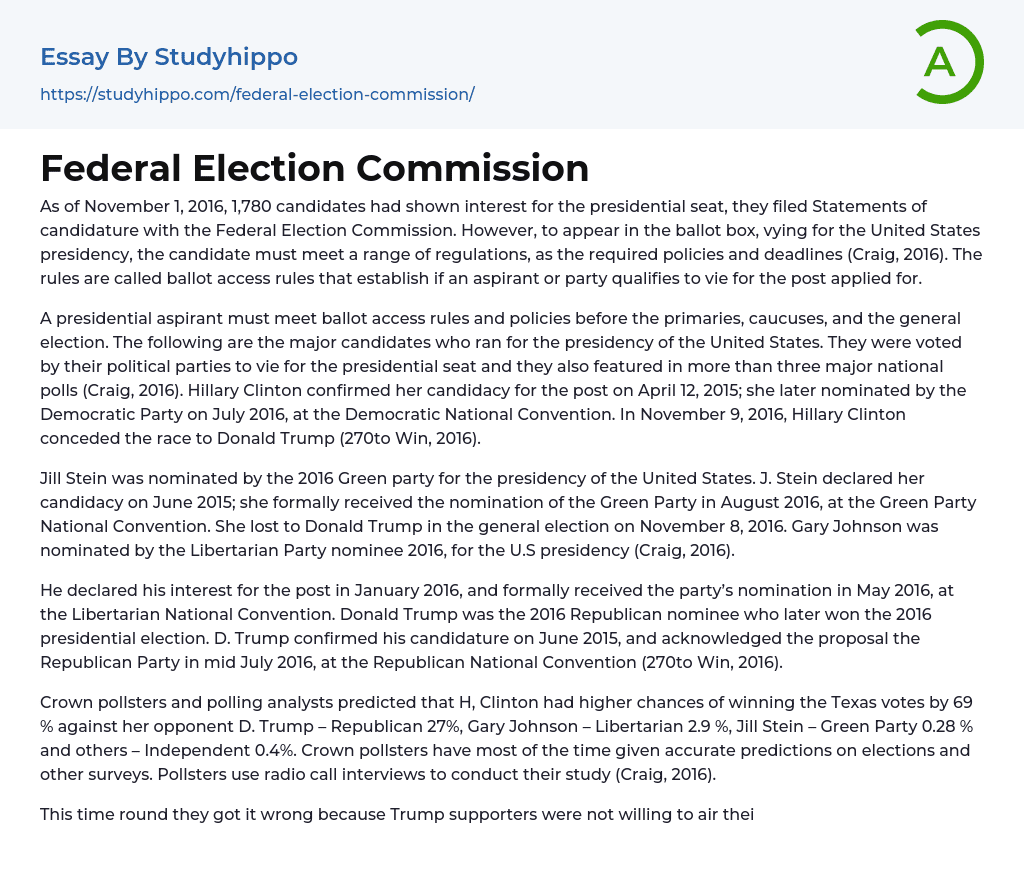A total of 1,780 individuals expressed their interest in running for the presidential seat by submitting their Statements of candidature to the Federal Election Commission on November 1, 2016.
The regulations for running for President of the United States include policies, deadlines, and other requirements (Craig, 2016). These rules, called ballot access rules, determine if a candidate or party can participate in the election. To compete in primaries, caucuses, and the general election, presidential candidates must follow these guidelines. Here is a list of the main contenders vying for the U.S. presidency.
Both Hillary Clinton and Jill Stein were selected as presidential candidates by their respective political parties. They both took part in national polls (Craig, 2016). On April 12, 2015, Hillary Clinton announced her official candidacy. Later on, she was nominated by the Democ
...ratic Party at the Democratic National Convention in July 2016. On November 9, 2016, Clinton acknowledged her defeat and conceded to Donald Trump (270to Win, 2016). At the same time, Jill Stein received the nomination of the Green party for the United States presidency in 2016.
In June 2015, Jill Stein announced her candidacy and was officially selected as the Green Party nominee in August 2016 at their National Convention. However, she did not succeed in the general election on November 8, 2016, losing to Donald Trump. In contrast, Gary Johnson declared his intention to run for the U.S presidency in January 2016 and was officially chosen as the Libertarian Party nominee in May 2016 at their National Convention. Eventually, Donald Trump became the Republican nominee in 2016 and ultimately won the presidential election.
Trump declared his candidacy in June 2015 and received the Republican
Party's nomination at the Republican National Convention in mid-July 2016. As indicated by Crown pollsters, it was anticipated that Hillary Clinton had a 69% probability of winning the Texas votes, while her competitors Donald Trump (Republican), Gary Johnson (Libertarian), Jill Stein (Green Party), and others (Independent) had lower chances of achievement. To ensure precise predictions, Crown pollsters employ radio call interviews as their methodology. Nonetheless, this time their forecasts went off course since numerous Trump supporters chose not to openly express their opinions, leading to an unexpected result for Clinton.
Donald Trump won Texas' 38 electoral votes, which is the second-largest Electoral College, by a significant margin compared to the pre-elections predictions (270to Win, 2016). Most pollsters got the predictions wrong, except for the Los Angeles Times. The Los Angeles Times is a reliable source with a long history of giving credible results. They got it right by conducting online surveys that produced reliable results. When comparing the actual results with the predictions, there is a noticeable margin of error.
Clinton and D. Trump received inaccurate predictions due to the methodology used. The pollsters relied on telephone polling, but H. Clinton's supporters did not hesitate to show their support for her, while D.
Trump supporters were reluctant to share their opinions, leading to inaccurate predictions from traditional telephone polls. The election results revealed that the failure to publicly express their views had a negative impact on the outcome. To address this issue, alternative strategies must be developed to reach out to individuals who prefer not to make their views known.
- Electoral College Pros And Cons essays
- Absolutism essays
- Appeal essays
- Bourgeoisie essays
- Contras essays
- Corporate Governance essays
- Corruption essays
- Democracy essays
- Democratic Party essays
- Developed Country essays
- Dictatorship essays
- Elections essays
- European Union essays
- Federalism essays
- Foreign essays
- Foreign policy essays
- Gentrification essays
- Hillary Clinton essays
- Income Tax essays
- International Relations essays
- John Marshall essays
- John Stuart Mill essays
- Left-Wing Politics essays
- Liberty essays
- Military essays
- Monarch essays
- Monarchy essays
- Political Corruption essays
- Political Party essays
- Political Science essays
- President Of The United States essays
- Public Service essays
- Red Cross essays
- Reform essays
- Republic essays
- Revenge essays
- Social Security essays
- Sovereign State essays
- State essays
- Supply essays
- Terrorism essays
- United Nations essays
- World Trade Organization essays
- Electoral College essays
- Presidential Election essays
- Presidential Elections essays
- Voting essays




